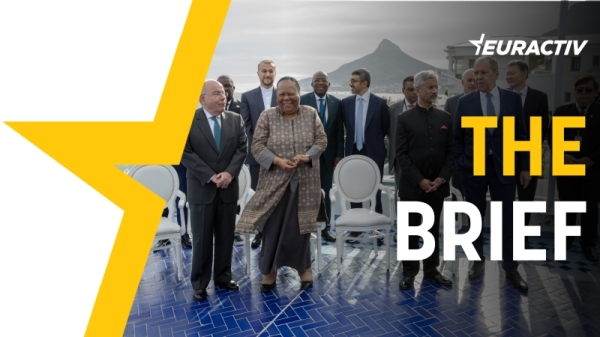The Brief — The building of the BRICS

In a sign that world geopolitics is shifting before our eyes, South African Foreign Minister Naledi Pandor said ahead of the ongoing summit of the BRICS states that the global order needs a rebalancing away the Western powers, asserting the BRICS’ wish to provide the necessary counterweight.
The BRICS countries – Brazil, Russia, India, China, and South Africa – currently account for about 40% of the global population, a figure that would increase significantly should Nigeria and others in the queue for membership be admitted to the bloc.
Pandor said that the BRICS group could provide global leadership and, while they do not yet punch with significant authority in international politics, it’s not such an outlandish claim.
However, the summit has been overshadowed by whether Russian President Vladimir Putin could attend without being arrested under a warrant from the International Criminal Court on war crimes charges.
The issue has left South Africa’s governing African National Congress – whose political relations with Russia date back to the apartheid era – in something of a diplomatic funk.
The geopolitical alignment has certainly changed, accelerated by the pandemic and Russia’s invasion of Ukraine.
Many African states – South Africa included – have sought to be ‘neutral’ on the war, through Ukrainian arguments about Russian colonialism do cut through.
South Africa is one of a group of African states who have tabled a ‘peace initiative’ to resolve the conflict that has been discussed with officials from Russia and Ukraine.
Ukraine has also realised the political importance of support from the Global South and has launched a diplomatic recruitment drive, opening a handful of new embassies in Africa and elsewhere and hiring dozens of foreign affairs specialists.
In an attempt to head off these demands for more international influence, the EU, United States and others have called for a permanent African seat on the UN security council and African Union membership of the G20. But that may not be enough.
For its part, the EU would be well advised to change its ‘Fortress Europe’ mantra.
Hakima el Haite, Morocco’s former energy minister who oversaw her country’s transition to renewable energy and is now president of the political party federation Liberal International, pointed to the manner in which the Carbon Border Adjustment Mechanism (CBAM) was passed into EU law in April, with minimal consultation with the Global South, as a political misstep by the bloc.
A carbon levy that will require importers to pay a carbon price equivalent to that paid by EU producers under the EU Emissions Trading System, EU leaders have repeatedly said that ameliorative measures would be readied to cushion the blow for African and developing countries. CBAM is now on the statute book with no such measures in place.
India is among a group of countries preparing a complaint to the World Trade Organisation about CBAM.
“This, technically, is a very good tool. But my question to Europe is, did you discuss with the world? Did you discuss with Africa, because this decision will certainly impact the Africans?” el Haite told EURACTIV, adding that worldwide carbon pricing would be far more effective than a European carbon border.
The perception that the EU has rushed the bill into law without facing African states risks pushing them into the arms of China and Russia, she added.
The EU must realise that it needs allies in the south and the west.
The Roundup
The European Parliament adopted its recommendations for the EU’s response to antimicrobial resistance (AMR) on Thursday, calling for national strategies and boosting innovation.
The Spanish government has requested the postponement of Prime Minister Pedro Sanchez’s speech to present the country’s EU Council presidency at the European Parliament, originally scheduled for 13 July, to the September plenary session.
Spanish opposition leader Alberto Núñez Feijóo, whom polls suggest could be Spain’s next prime minister, admitted on Thursday he didn’t speak English but brushed it off, saying there were always “translators”.
The head of the European Parliament Committee on Environment, Public Health and Food Safety (ENVI), Pascal Canfin, wants a hearing with agrochemical giants Bayer and Syngenta after researchers accused them of withholding information on the brain toxicity risk of pesticides.
Last but not least, check out this week’s Tech Brief for a round-up of policy news, and our video reportage Cluj-Napoca’s experiments with participatory budgets.
Look out for…
- Commission Vice-President Valdis Dombrovskis participates in conference titled Policymaking In Choppy Waters: Fostering Resilience In Central Eastern And Southeastern Europe on Saturday.
- Vice-President Vĕra Jourová speaks at Roundtable of EU and Democratic Russia Representatives on Monday.



